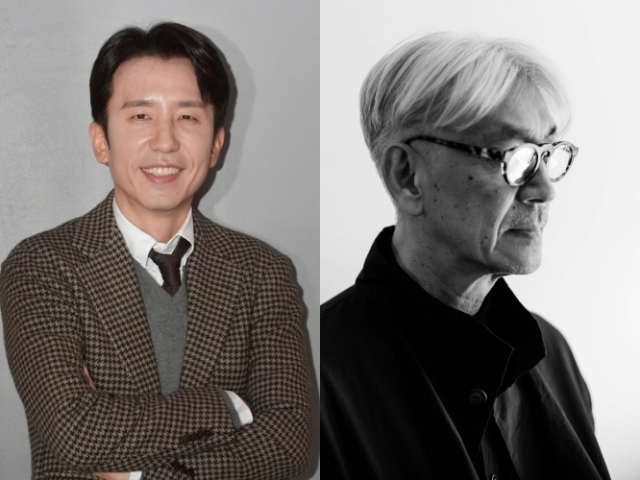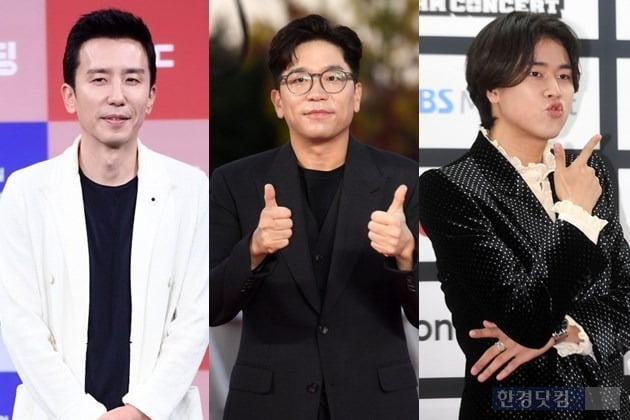Last June, famous Korean singer-songwriter You Hee-yeol's song ‘A Very Private Night’ was actively compared to the song ‘Aqua’ by composer Sakamoto Ryūichi, famous for Japanese film music, so much so that the artists soon became embroiled in controversy over plagiarism. This led many fellow musicians, including Lee Juck and Lee Mu-jin, to be embroiled in similar controversies over the rights to their melodies.
 |
| ▲ Korean Singer-Song Writer You Hee-yeol and Contrasted Photo of Ryuichi Sakamoto (Photo from Kukmin Ilbo) |
On June 14, You Hee-yeol posted an apology on Instagram admitting, ‘A Very Private Night’ and ‘Aqua’ have similarities. However, Sakamoto said he believes the melody and chord progression of the song were not plagiarized and has no plans to take legal action. “Every creation is influenced by existing art. It would be greatly appreciated if you could put 5~10% of your own originality into it”, he said. With these remarks, the plagiarism controversy seemed to be resolved, but some netizens raised further questions. ‘It Music Creative’, the company running Sakamoto’s project in Korea, gave no clear indication as to Sakamoto's personal position. Since the company also has a stake in the copyright of the song, some argued that it is difficult to determine whether You plagiarized it, if it is judged by only person. The controversy did not stop there. Soon You's other songs began to garner attention for negative reasons. Some online communities questioned whether ‘Happy Birthday to You’, written and composed by You and released by singer Sung Si-kyung in 2002, was plagiarized off Japanese singer Koji Tamaki's song ‘HAPPY BIRTHDAY.' Critics argued there is a great degree of similarity between the title and the overall flow of the lyrics and melodies. Another example, was ‘Please Don't Go My Girl', which he produced with Yoo Jae-seok and Kim George-han for the entertainment program Infinite Challenge. The content was criticized as being similar to even the choreography of 'Body Bumpin' which was released by Public Announcement. Aside from these cases, there have been several other criticisms raised of his work, but You disagreed with the additional revelations. His fellow musicians Lee Juck and Lee Mu-jin were also embroiled in the plagiarism charges. Some netizens have raised suspicions that Lee Juck's 'Lie Lie Lie' shows similarities in many parts, including the chorus, to Brazilian singer Raimundo Fagner's 'Rubi Grena.' Lee’s agency said, "The plagiarism charges are not true", taking a firm stance against critics. Likewise, people claimed that Lee Mu-jin's hit song 'Traffic Light' has a chorus like the Japanese band SEKAI NO OWARI's 'Dragon Night.' However, his agency stated that the song is based on his own experience, and it is not plagiarism after the melody and chord progression were analyzed. The public thinks many popular songs are plagiarized because they have high similarities in melody, lyrics, chorus, and even the concepts, but artists and their representatives are maintaining firm in their stance that there is no plagiarism.
 |
| ▲ You Hee-yeol and Other Fellow Musicians Who Committed Plagiarism (Photo from Hankyung News) |
Infringement of copyright refers to the act of using a work in a way that infringes on the copyright or moral rights without the permission of the copyright holder. In the case of copyright infringement, plagiarism is determined based on the actual similarity. In other words, plagiarism is recognized only when creative elements protected by the copyright law in existing creations, are copied or used in the same way 'intentionally.' Accordingly, the songs created by You Hee-yeol, Lee Juck, and Lee Mu-jin are similar in comparison to the songs they are suspected of plagiarizing, but whether they were intentionally copied is hard to prove. We have no choice but to leave it to the 'artist's conscience.' In addition, to compare the actual similarity, the melody, chords, rhythms, and music forms must be comprehensively judged. Since there is no definitive quantity for assessment, or a clear level of restriction, the standard for determining plagiarism is ambiguous. Even if there is a real similarity, the copyright infringer cannot be punished unless legal action is taken. Therefore, even if there are similarities in You’s music, there is no legal punishment because the supposed victim, Sakamoto Ryūichi, is not taking any legal action.
For a more professional judgment on this situation and to better understand the policy of copyright infringement, The DankookHerald (DKH) interviewed students and professors in the Department of Composition. They both said it is not easy for plagiarism to be clearly defined in law, not only in Korea, but also abroad. Art is always a subjective interpretation. Our current laws in Korea state that plagiarism is recognized only if the chorus of a piece of music is repeated and takes up a considerable amount of the content time, the contrast is significant compared to other parts, or the part is repeated several times. In the United States however, the law states that copying only 2 bars, 4 notes, and 2 words, is plagiarism. In other words, the current standards of music plagiarism-related laws in Korea are ambiguous as compared to the US. Composition major students felt that You Hee-yeol and other musicians produced melodies and used instruments that are quite similar, rather than a single piece of chord progression and overlapping instrument use. The content is not just a vague memory of listened music. More than anything else, it can be argued that overlapping multiple songs by one person is even more plagiarism. If we take a look at “A Very Private Night”, you can see that the chord progression is similar, and the melody is almost the same except for the transitional sounds. Both professors and students believe there is no standard that can clearly distinguish them when creating new work. As long as you don't copy the part in its entirety, it's okay to deny plagiarism. But when composing a melody, there are many steps, such as composing chords and non-harmonic notes, selecting instruments, etc. and it is quite rare that all of them overlap by chance. In that view, it is natural to conclude that You Hee-yeol has committed obvious plagiarism.
The act of plagiarism is an act of arbitrarily stealing the creations of other people and is absolutely illegal. In an era when Korean culture and K-pop are enjoying their heyday, the plagiarism controversy is undermining Korea's international prestige on copyrights. Accordingly, the DKH recognizes that the public, including composers, must not only continue to like and listen to music in the future, but also needs to recognize that the copyright for music creation is important, and must be protected and adhered to, so we can continue to freely enjoy our own unique creations.
전준형, 김주연, 황인경 dankookherald@gmail.com

![[Campus Magnifier] Let's Surf the Library!](/news/photo/202404/12496_1765_4143.jpg) [Campus Magnifier] Let's Surf the Library!
[Campus Magnifier] Let's Surf the Library!
![[Campus Magnifier] Let's Surf the Library!](/news/thumbnail/202404/12496_1765_4143_v150.jpg)





